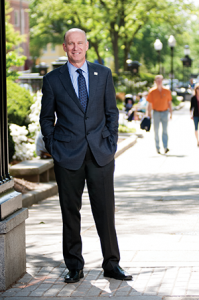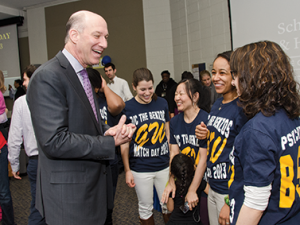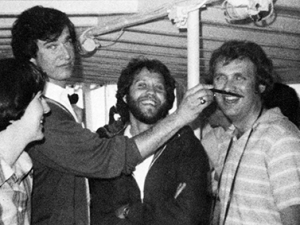Vice President and Dean Jeffrey S. Akman employs his gift for uniting people to benefit the School of Medicine and Health Sciences
Thanksgiving break, 1977. Jeffrey Scott Akman, union leader’s son and Duke University graduate, returns to his family’s Baltimore home having just completed his first few months of medical school at the George Washington University. His pleased parents and grandparents sit with him at the kitchen table, filled with pride and expectation. His grandmother, Bubbe Rose, reaches into her ample pocketbook and pulls out an assortment of pill bottles, perhaps 10 in all, and asks: “So, Jeff, do you think I’m on the right medications?”
Akman laughs as he thinks back to the scene. “I’d been in school for three months. But it struck me that it’s all part of how people see you and treat you as a doctor, and it’s part of the evolution of your own identity.”

So, years later, when a student approached Akman, by then director of medical student education in psychiatry and an assistant dean at GW’s School of Medicine and Health Sciences (SMHS), and said that he’d figured out that medical school was just a glorified vocational institution, Akman encouraged him to reconsider. “You don’t realize how you’ve evolved in your identity and your sense of yourself,” he recalls telling the student. “I wanted him to understand the developmental process that students go through when they become physicians, how their confidence and their professionalism evolves.”
Akman’s own identity is inextricably tied to SMHS, where he has been a student (M.D. ’81); a resident (G.M.E. ’85); a faculty member; an administrator; the Leon M. Yochelson Professor and Chair of the Department of Psychiatry and Behavioral Sciences; the interim vice president for health affairs and dean; and, as of January 2013, the Walter A. Bloedorn Chair of Administrative Medicine, vice president for health affairs, and dean. He arrived at the school just four years after Ross Hall opened in 1973, and his long experience with SMHS is a huge advantage in his new role, he says.
“I know the DNA of the school. I know it from so many different perspectives,” Akman says. “I know the culture and the history, and when I think about my role as dean, all my experiences are relevant.” During a recent trip to California, Akman spoke with a 1970s-era alumnus who expressed the hope that SMHS remains as supportive of its students today as it had been in his experience. “I replied that not only am I a product of that culture of collaboration, cooperation, teamwork, and support, I feel like I’m the guardian of it,” says Akman.
This does not mean that the dean’s stewardship equates to running in place. At a town hall meeting after he took office, Akman presented an ambitious list of priorities, including increasing the number of scholarships; maintaining tuition affordability; re-examining and revising the medical education curriculum; helping GW advance as a top-tier research university; enhancing diversity at SMHS; enlarging the school’s footprint internationally, especially in China; finishing the renovations to Ross Hall and planning for a new building; increasing space for teaching and labs at GW’s Virginia Science and Technology Campus in Ashburn; and, finally, revising the strategic plan as soon as new leadership appointments are finalized. An expansive agenda, to be sure.
“I know the DNA of the school. I know it from so many different perspectives,” Akman says. “I know the culture and the history, and when I think about my role as dean, all my experiences are relevant.”
At the same meeting, Akman commented that it was “kind of nice” to have a psychiatrist in the dean’s office. Although the remark drew knowing laughter, he was only half joking. “As a psychiatrist, you’re trained to deal with a range of personalities and group dynamics. You’re trained to listen carefully,” he says. “You have to be a leader and also to communicate your vision and priorities, but ultimately if you want change to occur, you have to get buy-in — and being a psychiatrist helps with that.”
When the search process began, says GW President Steven Knapp, he and Provost Steven Lerman were looking for a candidate who ideally had “the leadership and people skills necessary to serve as an ambassador for the university.”
“This is a particularly complex role,” explains Knapp. “Not only does the position entail all of the responsibilities and requirements of academic leadership as dean of a professional school, but also the vice president for health affairs serves as the liaison between the GW Hospital, the GW Medical Faculty Associates, Children’s National Medical Center, and the VA.”
In the area of building consensus, Akman has had some strong influences in his life. As the son of a union leader, he holds vivid memories of union halls packed with hundreds of workers, and watching as his father spoke, persuading them to accept or reject a contract. When Akman first became interested in medicine as an undergrad at Duke, his father’s cousin, Leonard Akman, M.D. ’43, a cardiologist who graduated from GW, gave him his first microscope. There was also former Dean Robert Keimowitz, M.D., who encouraged his choice of psychiatry, as well as other faculty members, including the late Winfield Scott, Ph.D., who mentored Akman and in 1988 recommended him for the board of the National Lesbian and Gay Health Foundation.

Akman was living in one of the hardest-hit areas of the HIV/AIDS epidemic in the early 1980s, and his work with the then fledgling Whitman-Walker Clinic and his treatment of HIV/AIDS patients is an enduring part of a medical career that has led to numerous honors, such as his selection by Washington, D.C., Mayor Vincent Gray to serve on the city’s Commission on HIV/AIDS. Akman also sees HIV/AIDS as an important research area on which to build; he recently hired Douglas Nixon, M.D., Ph.D., an internationally recognized HIV/AIDS researcher from the University of California at San Francisco, to chair the SMHS Department of Microbiology, Immunology, and Tropical Medicine.
He vividly recalls his early experiences as a clinician facing the burgeoning epidemic in 1984. Akman had a patient, a man in his 20s who was a photographer, who announced that he was suicidal. “He came into the hospital with an IV in his arm, as he was receiving intravenous treatments at home. He could have committed suicide if he really wanted to,” recalls Akman. “I learned that when patients say they want to die, frequently what they mean is that they want to live, and they are searching for hope. Despite his terminal illness, he was able to work through the pain and many of the losses he was dealing with. I learned a great deal from him.”

Akman has served as a willing role model for LGBT students and those unsure of their sexual orientation. His sense of inclusiveness prompted his friend and colleague Seymour Perlin, M.D., GW professor emeritus of psychiatry and behavioral sciences, to say that Akman “is an example of what every mentor or tutor hopes will emerge from their guidance and training. He possesses the gift of bringing people together.”
That gift will help Akman in his service to the school’s development office, which keeps him busy meeting alumni. “I truly value alumni and the role they play in the school; among other things, I’m prominently including them in special events such as our white coat ceremonies and graduations,” he says. One of Akman’s goals in the near future is to secure a gift for the naming of SMHS, which will go a long way in securing the school’s future.
“Set the bar high for medical and health sciences education, and our students will get there,” is how he expresses his education philosophy. Akman has set lofty heights for his own stewardship, and there is every expectation they will be reached.



